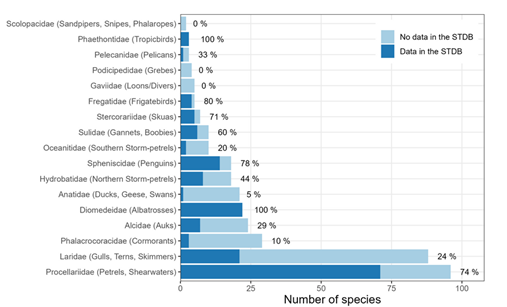Since its launch in 2004, the BirdLife Seabird Tracking Database (STDB) has become one of the most comprehensive marine conservation collaborations in the world. It hosts the largest collection of seabird tracking data in existence, transforming how researchers and policymakers address the growing threats to seabirds and the marine environment in general.
Photo: Gannet © Ray Harrington/Unsplash
By understanding where seabirds go, researchers and policymakers have been able to identify and inform the designation of important marine areas for increased protection. The database has also highlighted where birds are most at risk from bycatch resulting in increased measures to reduce this threat.
No less than 56% of seabirds are experiencing population declines and there is a growing number of new or emerging human pressures impacting seabirds in the marine environment, including offshore wind farms and the exploitation of new resources (i.e. deep-sea mining, mesopelagic fishing).
Figure from Carneiro et al. 2024: Total number of seabird species per family, and the number for which tracking data were available in the STDB in March 2024.
“The Seabird Tracking Database has not only deepened our scientific understanding of seabird ecology but has also driven tangible conservation outcomes, helping to protect threatened seabird populations worldwide.” – Dr Tammy Davies, co-author of the study and Marine Science Coordinator, BirdLife International
A review, published this week, presents an overview of;
- how the STDB started and gained traction
- its current status in terms of data coverage and gaps
- methodological developments,
- conservation successes, the opportunities and challenges experienced in managing this global database,
- and research priorities and future directions for seabird tracking studies.
To read the review click here

